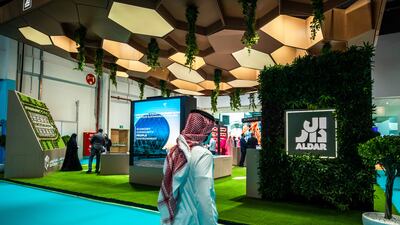Aldar, the UAE's biggest listed property company, has signed an agreement with Emirates Water and Electricity Company (Ewec) to power all of its owned and managed assets with clean energy sources for up to five years, as part of efforts to reduce its carbon footprint.
The clean power will be supplied to Aldar’s assets from Ewec’s clean energy sources. These will be validated through Clean Energy Certificates registered by Ewec, a scheme that was launched by the Abu Dhabi Department of Energy to enable companies in the emirate to validate claims of producing and consuming renewable or clean electricity, Aldar said in a statement on Monday.
"There has never been a time more critical for the corporate community to acknowledge the impact that real estate assets have on the environment," said Greg Fewer, Aldar's chief financial officer.
"Buildings account for 37 per cent of today's global CO2 emissions when both operational emissions and embodied emissions of materials are taken into account. It is evident that sustainable buildings are one of the most effective means of tackling this global challenge."
The move is part of Aldar's wider sustainability goals. Last week, the company launched a portfolio-wide energy management project to reduce its energy consumption by about 20 per cent across 80 assets including hotels, schools, commercial, leisure, retail and residential buildings. Besides reducing energy emissions, the project will allow Aldar to save about Dh40 million ($10.8m) a year in energy consumption costs.
Earlier this month, Aldar said it increased its ESG ratings within two major global benchmarks, the Dow Jones Sustainability Index (DJSI) and Sustainalytics. It also maintained its BB rating in the 2021 Morgan Stanley Consumer Index (MSCI), which tracks exposure to ESG risks and how well companies manage those risks relative to peers.
Currently, Scope 2 emissions, which are related to the purchase of electricity from the grid, are the biggest source of greenhouse gas emissions at Aldar’s real estate assets. The new agreement with Ewec will reduce those emissions and support decarbonisation across the company’s portfolio, Aldar said.
“We are really excited to see key Abu Dhabi companies such as Aldar taking the lead on reaching zero carbon by certifying the origin of the power consumed from the grid through the clean energy certificate scheme, joining other major energy, industrial, healthcare and commercial entities taking positive action to reduce carbon emissions," said Francois Brice, commercial executive director at Ewec.
Aldar's sustainability initiatives are in line with the UAE's efforts to promote a green economy. The UAE is committed to reaching net-zero emissions by 2050, making it the first country in the Middle East and North Africa region to do so. By 2050, the Emirates will invest Dh600 billion in clean and renewable energy sources.
The Arab world’s second-largest economy is developing several clean energy projects to achieve its sustainability goals by 2050. It is constructing the Barakah Nuclear Energy Plant, the Arab world’s first multi-unit operating nuclear energy plant.
The country is also building renewable energy projects to boost the supply of clean energy, including the world’s largest solar plant in Al Dhafra region of Abu Dhabi. The 2-gigawatt plant is expected to be fully operational this year.
Dubai is developing the 5-gigawatt Mohammed bin Rashid Solar Park as part of its strategy to cut emissions.
In 2023, the UAE will become the first Gulf Arab nation to host the Cop summit.


